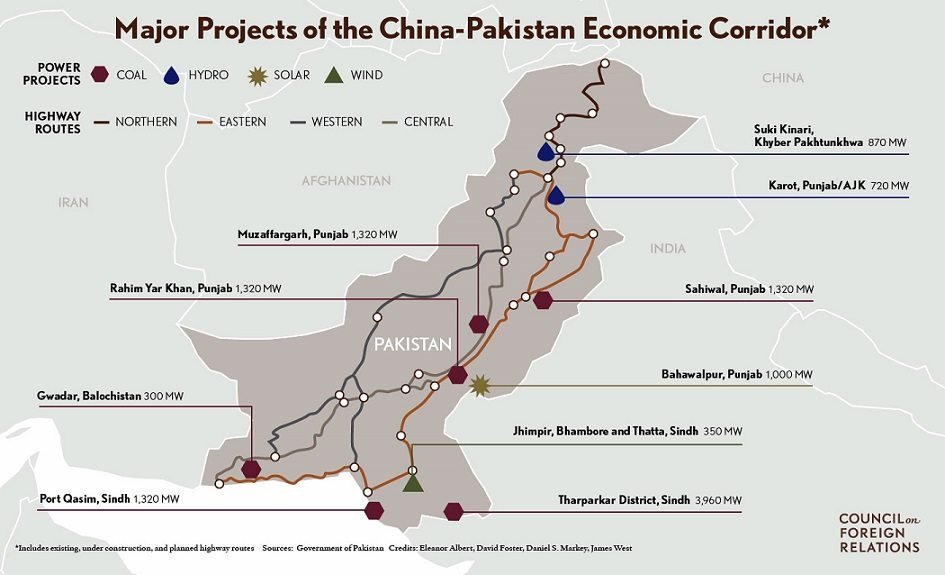 China-Pakistan Economic Corridor (CPEC), one of the vital segments of One Belt One Road (OBOR), offers a great opportunity to investors in several sectors with power in particular.
China-Pakistan Economic Corridor (CPEC), one of the vital segments of One Belt One Road (OBOR), offers a great opportunity to investors in several sectors with power in particular.
The $1 trillion projects, often described as a 21st-century silk road, made up of a ‘belt’ of overland corridors and a maritime ‘road’ of shipping lanes, is the brainchild of Chinese President Xi Jinping.
The ambitious development project focuses on improving connectivity and cooperation among multiple countries across Asia, Africa, and Europe. Of the total estimated cost of $270 billion is expected to be spent in Asian regions to build roads, power plants, dry ports, oil and gas, mining and many other infrastructures.
In Pakistan, a major chunk ($58 billion) of the investment is being spent on road projects, power plants, and Gwadar port.
Pakistan has been endowed with huge natural resources. Unfortunately, due to flawed policies and misplaced priorities of successive governments, these resources have not been exploited and utilized for the development of social infrastructures such as education, health, water and sanitation, road and basic human needs of the rural populace to improve their living standard. The people are being ignored or kept in dark about the projects.
For Gilgit-Baltistan, CPEC offers huge opportunities as well as challenges. Gilgit-Baltistan’s fragile ecosystem will be affected by the CPEC road project as it passes through a 600km stretch of the unstable mountainous region. But not a single project under CPEC has been identified and approved in GB.
Neither the mineral resources are being harnessed to use them for the welfare of the community. There are several methodologies to follow through development organizations to train local people including women and empower them to develop the mineral resources on modern lines.
Tourism is another mainstay of the GB economy and major contributor to job market which also faces the apathy of the policymakers and the government in developing it as an industry.
The world powers have played great games in GB because of its geostrategic importance and natural resources. The CPEC project has once again brought the GB to the limelight.
The arrival of Chinese people to Pakistan in large number shows the interest of China in the areas. The Chinese investors are eying the huge mineral, tourism and water potentials. But they are least concerned about the unique culture, fragile mountain ecology, customary laws, and centuries-old traditions of the indigenous people. They foreign investors through their local front men want to grab their resources by hook or by crook. This may create tension and discord among the local people.
The local administration instead of safeguarding the interests and rights of the local people are facilitating the foreign individual people and companies and intimidating the people to dispossess them from their land and resources.
Most of the Chinese companies are least concerned about the rights of the people. There is a common perception in Pakistan that Chinese companies are behaving like East India Company.
The people in the mountainous region of Gilgit-Baltistan are feeling threatened. The community organizations and conservation societies are under threat as the local administration at the behest of the influential investors are pushing them to the wall. Efforts are being made to alter the centuries-old conservation and ecological balance, in sheer violation of rules to benefit few individuals and foreign investors.
This is the duty of the government to protect the fauna and flora. If the government does not contribute to conservation efforts at least it has no right to facilitate some elements to destroy the community initiatives.
Who will be responsible for the protection and conservation of rare species in the conservation areas and what else if they are not being treated as per international law?
Of course, the community needs to be united to raise their voice nationally and internationally. The local community will not tolerate and accept such illegal activities and bullying behavior at any level. This is the right time to resist such moves by all means with the unity of thought, clear vision, legal action, and political strength.
According to a UN resolution clearly emphasizes the protection of the rights of indigenous people and the fauna and flora. The government should take the local communities onboard before taking any decision on mining and other commercial activities in protected areas.
Also, the indigenous people should also adopt effective approaches with a clear understanding of international obligations.
 Raheem R. Sherazi is a freelance columnist, social and environmental activist. He can be reached at: noziyoun@hotmail.com
Raheem R. Sherazi is a freelance columnist, social and environmental activist. He can be reached at: noziyoun@hotmail.com

The High Asia Herald is a member of High Asia Media Group — a window to High Asia and Central Asia

